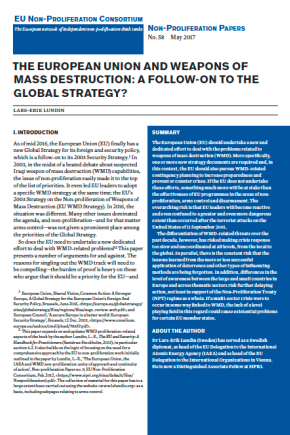The European Union and Weapons of Mass Destruction: A Follow-on to the Global Strategy?
The European Union (EU) should undertake a new and dedicated effort to deal with the problems related to weapons of mass destruction (WMD). More specifically, one or more new strategy documents are required and, in this context, the EU should also pursue WMD-related contingency planning to increase preparedness and prevent or counter crises. If the EU does not undertake these efforts, something much more will be at stake than the effectiveness of EU programmes in the areas of nonproliferation, arms control and disarmament. The overarching risk is that EU leaders will become reactive and even confused to a greater and even more dangerous extent than occurred after the terrorist attacks on the United States of 11 September 2001.
The differentiation of WMD-related threats over the past decade, however, has risked making crisis response too slow and uncoordinated at all levels, from the local to the global. In parallel, there is the constant risk that the lessons learned from the more or less successful application of deterrence and other types of influencing methods are being forgotten. In addition, differences in the level of awareness between the large and small countries in Europe and across thematic sectors risk further delaying action, not least in support of the Non-Proliferation Treaty (NPT) regime as a whole. If a multi-sector crisis were to occur in some way linked to WMD, the lack of a level playing field in this regard could cause existential problems for certain EU member states.

